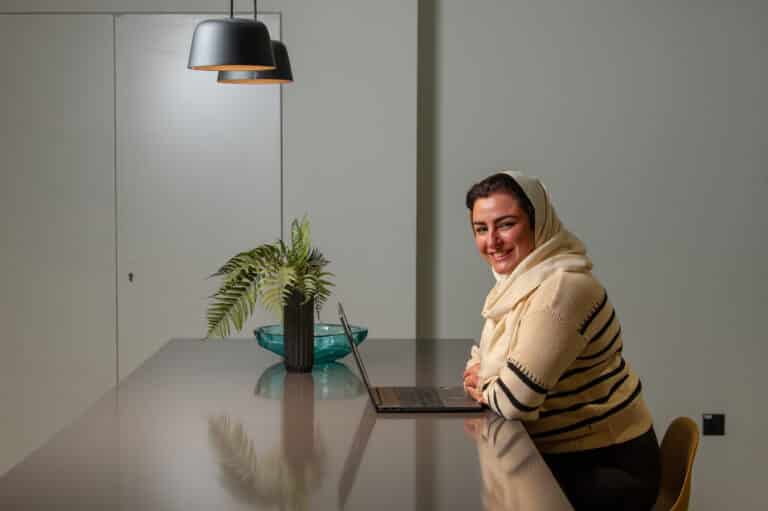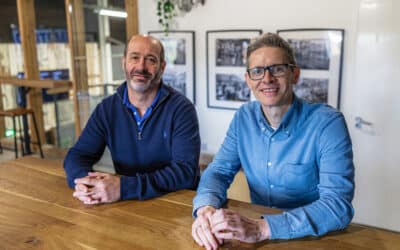As profits for fossil fuel companies continue to soar into the billions, consumers are still struggling under the pressure of mounting energy bills.
It’s not just households feeling the pinch. There’s an increasing urgency for renewable energy solutions, as the consequences of climate change loom and the government’s net zero ambitions fade with the announcement to approve hundreds of new oil and gas licences.
UrbanChain, a female founded energy tech company based in Manchester, firmly believes it’s found the key to change a “broken” energy market in the UK.
“There’s currently a broken cycle. Renewable energy is linked to the wholesale market which is not viable,” Dr Somayeh Taheri, CEO and founder of UrbanChain, tells Prolific North.
“Government subsidy comes in, then that subsidy tends to play a big part of our bill. In addition to the wholesale market price fluctuation, consumers suffer without energy.“
Claiming to be the only trading platform for renewable energy in the UK, the company’s mission is to help make energy greener and more affordable through its peer-to-peer energy exchange system.
The exchange system connects generators of renewable energy with consumers, who might be private businesses, local authorities, social housing associations, hospitals or schools.
By “decoupling” renewable energy from the wholesale market it cuts through layers of bureaucracy, meaning renewable energy generators no longer need to sell to intermediaries, and those intermediaries don’t need to sell to the wholesale market, reducing costly bills.
“This is what causes a monopoly in the energy space. It means that the wholesale market is defining the price you can offer for renewable energy, meaning consumers are exposed to high prices as that’s the time the market is buying back energy.”
With the backing of the government’s Department for Energy Security and Net Zero, UrbanChain is now gaining momentum in establishing its decentralised system.
“We thought: ‘Okay, why don’t we remove renewable energy from the wholesale market and create an alternative market for renewables?” she explains.
“By doing this, we manage the end-to-end relationship between this alternative market and end user, so people are paying as they go for renewable power.”
How UrbanChain works, the future and scaling rapidly
After moving to Manchester from Iran to do a PhD in 2010, Taheri began to work on a number of research projects from fuel poverty to climate change which is when the “penny dropped.”
As blockchain technology continued to hit the headlines in 2015, she started to think about how this technology could play a part in different sectors, particularly after seeing a movement of local authorities calling for greater devolved powers.
“I started to understand that everything is done centrally and there’s no coordination between authorities if they want to move to a distributed system.
“That was our lightbulb moment. Everything is distributed locally but we couldn’t deliver it because technology is centralised. We needed a distributed system to manage it.”
She turned her attention to the energy sector and began building the idea behind UrbanChain in 2017.

Driven by blockchain technology and AI, UrbanChain’s peer-to-peer exchange matches the best renewable energy generators to consumers on a half hourly basis.
AI is used to profile consumption behaviours and production patterns while blockchain technology runs the infrastructure, from registering consumers to running smart contracts.
Since 2021, the company has continued to scale. Awarded more than £2.1m in funding from Innovate UK and a number of government bodies since launching, last year the company’s turnover hit £2.6m which Taheri expects to be “much higher” this year.
Closing a recent £5.25m Series A round, led by leading global investment firm Eurazeo, will further fuel the company’s plans to expand internationally.
Thanks to a turnover pipeline of £22m for the next 12 months, with one terawatt hour (TWh) of renewable energy generation available in the company’s energy exchange, she has bold plans to float the company within the next five years.
“This funding is going to help us to scale up on what we are doing internationally through technology, infrastructure and our team,” she explains.
Intelligent chips, used to speed up and simplify AI systems, might feature in UrbanChain’s future too.
“In the future, we believe our system will turn to intelligent chips which will be part of smart meters for anyone – households or businesses. You’ll be able to download your energy similar to the way you download information to your SIM card. It will be completely affordable.
“You won’t be thinking about signing or switching contracts every year or two to find the best deal and worrying about the prices going up.”
Starting out with corporate consumers initially, Taheri is passionate about making UrbanChain’s peer-to-peer exchange system available to everybody eventually to tackle fuel poverty.
“We don’t die without the internet but communications are a key part of infrastructure for each city. Interestingly, the internet is affordable for most of us. But without energy, we are cold, we have health issues, yet energy is not affordable for all of us,” she explains.
“Energy is seen as a luxury rather than a necessity. During Covid, we went into an energy and cost of living crisis. We didn’t talk about issues with not having access to the internet, because it’s available and affordable for many.
“This shouldn’t be happening for energy, it’s our vision to change this.”











